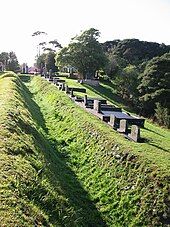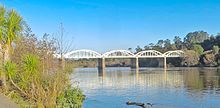Tuakau
Tuakau | |
|---|---|
 Tuakau Memorial Hall | |
 | |
| Coordinates: 37°16′S 174°57′E / 37.267°S 174.950°E | |
| Country | New Zealand |
| Region | Waikato |
| District | Waikato District |
| Ward | Awaroa ki Tuakau Ward |
| Community | Onewhero-Tuakau Community |
| Electorates | |
| Government | |
| • Territorial Authority | Waikato District Council |
| • Regional council | Waikato Regional Council |
| Area | |
• Total | 8.31 km2 (3.21 sq mi) |
| Population (June 2024)[2] | |
• Total | 6,180 |
| • Density | 740/km2 (1,900/sq mi) |
| Postcode(s) | 2121 |
Tuakau (Māori: Tūākau) is a town in the Waikato region at the foot of the Bombay Hills,[3] formerly part of the Franklin District until 2010, when it became part of Waikato District in the North Island of New Zealand. The town serves to support local farming, and is the residence of many employees of New Zealand Steel at Glenbrook.
Toponymy
[edit]The place name is believed to be a geographical reference to the high bluff nearby that offers views down the Waikato river. In Māori the word tū can mean 'to stand' and ākau 'river bank'.[4]
History and culture
[edit]Pre-European history
[edit]The area was first used as a trading centre for passing waka that would transport goods up and down the Waikato River.
European settlement
[edit]
A flax mill was built in 1855.[5]
In 1863 war broke out because the British Crown forced the Waikato people out of their lands just south of the river and the New Zealand Government stationed in Tuakau Imperial troops brought over from Great Britain.[clarification needed] To help defend the area the Alexandra Redoubt was built as a defensive fort on the bluff near the river. The existing town which was originally intended to be built closer to the Waikato River was subsequently built in an area 2 km further inland.
The railway from Auckland reached Tuakau in 1875, when the Tuakau Railway Station was opened.
Recent history
[edit]By 1914 the people of Tuakau had formed their own town district which went on to achieve borough status on 1 January 1955.[6] During its 44 years as a borough, Tuakau had seven mayors:[7][dead link]
| Name | Term | |
|---|---|---|
| 1 | E.A. Clayton | 1955–1959 |
| 2 | T.F. Hutchinson | 1959–1961 |
| 3 | A.H. Lockyer | 1961–1962 |
| 4 | G.A. McGuire | 1962–1971 |
| 5 | E.B. Wild | 1971–1980 |
| 6 | T.N. Tuhimata | 1980–1983 |
| 7 | H.B. Armitage | 1983–1989 |
Amalgamations since 1989 has seen it first become part of the Franklin District governed by a district council and then in 2010 with border changes saw it became part of Waikato district when present-day Auckland Council boundaries were created.
Marae
[edit]Tuakau has two marae (Maori sacred or communal place), affiliated with the hapū (Māori sub-tribe or clan) of Waikato Tainui (a tribal confederation based in the Waikato Region). Ngā Tai e Rua Marae and its Ngā Tai e Rua meeting house are a meeting place Ngāti Āmaru, Ngāti Koheriki and Ngāti Tiipa. Tauranganui Marae and its Rangiwahitu meeting house are a meeting place for Ngāti Āmaru Ngati Rangiwahitu , Ngati Kaiaua and Ngāti Tiipa.[8][9]
Bridges
[edit]Tuakau Bridge
[edit]
The town's 'Tuakau Bridge' replaced the need for a ferry from November 1902.[10] A span of the original wooden bridge[11] collapsed on 23 August 1929[12] and was replaced by the current £24,000 ($2.9m at 2015 prices),[13] 750 ft (230 m) bridge from 22 June 1933,[14] designed by Jones & Adams,[15] who also built Horotiu (1921), Te Aroha (1926), Ngamuwahine River (1930) and Fairfield bridges (1937).[16] It was once part of State Highway 22.
Gas pipeline aerial crossing
[edit]About 3 km (1.9 mi) upstream from Tuakau Bridge, at the end of Brown Rd,[17] the river is crossed by the First Gas 400-line gas transmission pipe, which supplies gas from the Maui gas pipeline at Rotowaro to Auckland and Northland.[18] The 350 mm (14 in) pipe crosses on a 376 m (411 yd), 11 pier, truss bridge, 14 m (46 ft) above the water, which was built in 1980 and renovated in 2007.[19]
Demographics
[edit]Tuakau covers 8.31 km2 (3.21 sq mi)[1] and had an estimated population of 6,180 as of June 2024,[2] with a population density of 744 people per km2.
| Year | Pop. | ±% p.a. |
|---|---|---|
| 2006 | 3,609 | — |
| 2013 | 4,272 | +2.44% |
| 2018 | 5,013 | +3.25% |
| Source: [20] | ||
Before the 2023 census, the urban area had a smaller boundary, covering 5.35 km2 (2.07 sq mi).[1] Using that boundary, Tuakau had a population of 5,013 at the 2018 New Zealand census, an increase of 741 people (17.3%) since the 2013 census, and an increase of 1,404 people (38.9%) since the 2006 census. There were 1,632 households, comprising 2,457 males and 2,559 females, giving a sex ratio of 0.96 males per female, with 1,293 people (25.8%) aged under 15 years, 1,041 (20.8%) aged 15 to 29, 2,094 (41.8%) aged 30 to 64, and 582 (11.6%) aged 65 or older.
Ethnicities were 69.1% European/Pākehā, 32.6% Māori, 8.4% Pacific peoples, 8.5% Asian, and 1.2% other ethnicities. People may identify with more than one ethnicity.
The percentage of people born overseas was 18.0, compared with 27.1% nationally.
Although some people chose not to answer the census's question about religious affiliation, 54.1% had no religion, 32.6% were Christian, 2.0% had Māori religious beliefs, 2.1% were Hindu, 0.4% were Muslim, 0.7% were Buddhist and 1.7% had other religions.
Of those at least 15 years old, 423 (11.4%) people had a bachelor's or higher degree, and 852 (22.9%) people had no formal qualifications. 546 people (14.7%) earned over $70,000 compared to 17.2% nationally. The employment status of those at least 15 was that 2,019 (54.3%) people were employed full-time, 495 (13.3%) were part-time, and 177 (4.8%) were unemployed.[20]
| Name | Area (km2) |
Population | Density (per km2) |
Households | Median age | Median income |
|---|---|---|---|---|---|---|
| Tuakau North | 2.69 | 3,147 | 1,170 | 1,035 | 32.6 years | $34,100[21] |
| Tuakau South | 2.66 | 1,866 | 702 | 597 | 31.7 years | $30,200[22] |
| New Zealand | 37.4 years | $31,800 |
Public Sporting Facilities
[edit]Tuakau has sporting facilities available to the public. The Dr John Lightbody Reserve sporting complex on George Street features a swimming pool, sports fields, tennis courts, netball courts and a skate park. The Tuakau Centennial Swimming Pool is open to the public, is used for swimming lessons and is used by Tuakau School and Tuakau College for sports days. The sports fields are used for athletics, and team sports including rugby, touch rugby, soccer. The sports fields have change rooms and a rugby club rooms. The following sports clubs use or are based in the complex: Tuakau Rugby Football Club, Tuakau Soccer Club. The reserve has public toilets.
Education
[edit]The main primary school is Tuakau School, where Sir Edmund Hillary and Hugh Poland were educated.[23]
It is a co-educational state primary school,[24][25] with a roll of 276 as of August 2024.[26]
Harrisville School is located to the north, at Harrisville.
Tuakau College is the district's state secondary school,[24][27] with a roll of 1007.[28]
References
[edit]- ^ a b c "ArcGIS Web Application". statsnz.maps.arcgis.com. Retrieved 19 April 2024.
- ^ a b "Aotearoa Data Explorer". Statistics New Zealand. Retrieved 26 October 2024.
- ^ "Tuakau Travel Guide". Jasons Travel Media.
- ^ Tuakau, nzhistory.net.nz
- ^ "Maori Mills. (Maori Messenger: Te Karere Maori, 1855-03-01)". paperspast.natlib.govt.nz National Library of New Zealand. Retrieved 24 April 2017.
- ^ The Heritage Studio (July 2017). Franklin County Council Chambers (Former) (PDF) (Report). Auckland Council.
- ^ "Timeline of Auckland mayors". Auckland Council Archives. Retrieved 12 September 2019.
- ^ "Te Kāhui Māngai directory". tkm.govt.nz. Te Puni Kōkiri.
- ^ "Māori Maps". maorimaps.com. Te Potiki National Trust.
- ^ C W Vennell & Susan Williams: Raglan County Hills and Sea 1876–1976 p. 158
- ^ "Bridge Over Waikato (New Zealand Herald, 1933-03-28)". paperspast.natlib.govt.nz National Library of New Zealand. Retrieved 25 March 2017.
- ^ "Papers Past — Auckland Star — 24 August 1929 — Page 9". paperspast.natlib.govt.nz (with 2 photos). Retrieved 17 April 2016.
- ^ Bank of New Zealand inflation calculator Archived 30 June 2013 at the Wayback Machine
- ^ Waikato District Council: Tuakau Structure Plan Built Heritage Assessment 2014 – with photos
- ^ "Proposed New Concrete Bridge Across The Waikato River at Tuakau. The Raglan County Council Has Decided To Adopt The Proposal To Re-erect The Tuakau Bridge at an Estimated Cost Of £24,000. The Structure Will Be The First Reinforced Concrete Bowstring Girder Type of Bridge To Be Erected in This Country. The Engineers Are Messrs. Jones And Adams. (with photo)". The New Zealand Herald. 30 May 1930. p. 8. Retrieved 17 April 2016.
- ^ "Search the List | Fairfield Bridge | Heritage New Zealand". www.heritage.org.nz. Retrieved 17 April 2016.
- ^ "New Zealand Topographic Map – NZ Topo Map". NZ Topo Map. Retrieved 9 November 2017.
- ^ "Gas Transmission Asset Management Plan – 2016" (PDF). First Gas.
- ^ "Case Study: Waikato River Aerial Crossing. New Zealand" (PDF). Vector Gas. 2007.
- ^ a b "Statistical area 1 dataset for 2018 Census". Statistics New Zealand. March 2020. Tuakau North (170000) and Tuakau South (170300).
- ^ 2018 Census place summary: Tuakau North
- ^ 2018 Census place summary: Tuakau South
- ^ Scholefield, Guy, ed. (1940). A Dictionary of New Zealand Biography : M–Addenda (PDF). Vol. II. Wellington: Department of Internal Affairs. p. 172. Retrieved 13 December 2015.
- ^ a b "Tuakau Official Schools Website". tuakau.school.nz.
- ^ "Tuakau School Ministry of Education School Profile". educationcounts.govt.nz. Ministry of Education.
- ^ "Tuakau School Education Review Office Report". ero.govt.nz. Education Review Office.
- ^ "Tuakau College Ministry of Education School Profile". educationcounts.govt.nz. Ministry of Education.
- ^ "Tuakau College Education Review Office Report". ero.govt.nz. Education Review Office.
